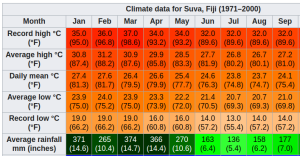“How do you like Suva,” asked the taxi driver.
I was about to reply honestly, when I saw the expectant look on his face.
“Yeah, it’s great,” I said.
A relieved smile crossed his face.
Far be it from me to give him the news that it’s wet, and hard to get around.
WET
Suva is even wetter than Whangarei, according to the boffins;


And so it proved. It rained, off and on, most of the 24 hours I was there.
TRAFFIC
My hotel was near a school. Big mistake. When school goes in ( 7.45 a.m. – 8.45 a.m. ) or out ( for an hour after 2pm ) there is traffic lined up as far as can be seen.
The taxi drivers I met ( four of them ) told me that’s typical, and is just as bad at office closing and opening hours.
COLONIAL BUILDINGS
The rest of the batch of short videos I took are at youtube.
THE BUSES
The bus service between Nadi and Suva is fantastic. I paid $40 for the round trip, Nadi – Suva Wednesday, and return Thursday.
The trip ( ~= 120km ) is about four hours each way, in comfortable buses with air-conditioning.
The only downside is the music, which is dire Christian drek.
It’s an express service, which stops at Sigatoka for a food break, and several small towns on the way. At Sigatoka, it cost me $1 at a bus station stall to buy five Indian dough balls made with flour, eggs, and spinach. Bawachi or Palak without the cheese.
Sigatoka is on a river, and close to some swimmable beaches, so it is a candidate for my new base after the lease runs out here in Nadi in 12 days or so.
THE ROUTE
The route, the Queens Road, is dotted with small villages. Many of them are doing it hard, full of subsistence-level concrete and tin shacks.
At one quick pick-up stop, a couple of white girls embarked. They were being herded by a Fijian man and his young daughter, who’d likely been hosting them. As the bus pulled out, the Fijian man gave his daughter a quiet fist-pump. He’d possibly just earned a few months’ wages.
The rest of the coast has been claimed by gated resorts commanding weekly rents which would easily buy a new car.
THE HOTEL
With my usual foresight and planning, I’d booked the hotel the night before.
I’d paid too much for a room about 15 minutes’ walk from the city centre, and was disappointed with the result, a concrete box containing a bed.
Resigning myself to my fate, I tried to set up the TV-HDMI connection with my laptop. No dice. After an hour, a small puddle formed on a bedside table. It was coming from the air-conditioning.
After complaining as tactfully as I could, the desk girl ( as in Vietnam, this hotel was run by super-capable young women ) upgraded me to a delux room upstairs. With an ensuite. Booyah!
VAPES
Part of the reason for the trip was to shore up my vape supply. Everywhere in Fiji I’ve asked I’ve been met with the kind of look you’d get if you asked for crack.
I was able to find a vape shop. Which wasn’t easy, given that a licence to import e-cigarettes for sale is gold here.
That, and a chance to see the Coral Coast and Pacific Coast, made the caper worthwhile.

3 replies on “Suva – 24 hours”
So Suva is just like Whangarei? Only smellier and wetter?
Oh wait, but about 20 degrees warmer…I vote for Suva. And Whangarei is not so much a holiday destination.
Im just curious about a lot of the place names have oka or toka at the end of them, wondering if thats a generic sort of name meaning town or village etc.
Have you come across any local coffee there? I know you like a portion of the dark stuff. It usually grows at altitude dosent it, possibly theres not enough farmable land up high there but would be interesting to find out.
Enjoying the posts, keep em coming postman pat, I mean Dunc
Hehe
I think I’d prefer Whangarei in spring or autumn, Suva’d be too hot. And Whangarei has better beaches.
I’ve not seen a real cafe here in Nadi. I did go to a really good one in Suva, Mana (!) Coffee.
Re the place name suffixes, yeah, I noticed that too. -Mr. Google won’t tell give me a definition, so I’ll have to ask a native.
An old guy I managed to grill about the placenames in Sigatoka tells me that ‘toka’ means something similar to “behold”, or “there it is”, or “voila”.
“Siga” is sun. When the first villagers arrived at sunrise, legend has it one of them said “Sigatoka” – “there’s the sun”.
He did tell me what the “Lau” part of Lautoka means, but it got lost in translation.
Another common suffix is “levu”, which from what I gather is something like “plenty”, or “great”. “Nui”, if you will.
Right, I hope you took notes. There’ll be a quiz.